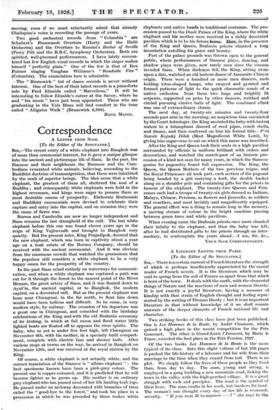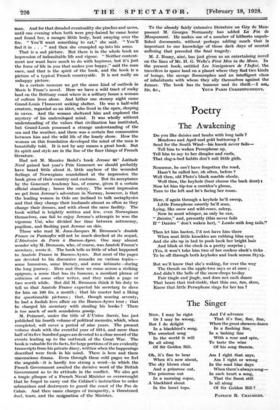A LITERARY LETTER FROM PARIS.
[To the Editor of the SPECTATOR.]
SIR,—There is a certain current of French literature the strength of which is perhaps insufficiently appreciated by the casual reader of French novels. It is the literature which may be said to spring from the soil of France as apart from that which is born of the town. It deals with the earth, with the elemental things of Nature and the reactions of men and women thereto. It is not exactly a joyful literature, having a measure of kinship with that strain of English thought and feeling repre- sented by the writing of Thomas Hardy ; but it is an important literature in that without knowledge of it we shall remain unaware of the deeper elements of French national life and character.
Two striking books of this class have just been published. One is Les Hommes de la Route, by Andre Chamson, which gained a high place in the recent competition for the Prix Goncourt. The other is Grand-Louis I 'Innocent, by Marie le Franc, awarded the first place in the Prix Femina, 1927.
Of the two books Les Hommes de la Route is the more typical of its class. Into this slight volume of but 250 pages is packed the life-history of a labourer and his wife from their marriage to the time when they ceased from toil. There is no plot. We simply follow the lives of these people as they lived then, from day to day. The man, young and strong, is employed in a gang building a new mountain road, linking the town in the valley with the high-perched village. It is a great struggle with rock and precipice. The road is the symbol of their lives. The man exults in his work, but hankers for land. The woman's one thought every day of her life is economic security. " If you were ill to-morrow " she says to the man. And for that dreaded eventuality she pinches and saves, until one evening when both were grey-haired he came home and found her, a meagre little body, bent swaying over the fire. " You'll want something to eat," she said. " You'll find it in . . . " and then she crumpled up into his arms.
That is a sad picture; But there is in the whole book an impression of indomitable life and vigour. " Neither content- ment nor want have much to do with hapiness, but it's just the force of life in you that makes you happy," said the man once, and that is the spirit of the book, and the book is a picture of a typical French countryside. It is not really an unhappy picture.
In a certain measure we get the same kind of outlook in Marie le Franc's novel. Here we have a wild tract of rocky land on the Brittany coast where in a solitary house a woman of culture lives alone. And hither one stormy night came Grand-Louis 1'Innocent seeking shelter. He was a half-wild creature, regarded as an idiot, who lived in the open, sleeping in caves. And the woman sheltered him and explored the mystery of his undeveloped mind. It was wholly without understanding of the values that civilization has instituted, but Grand-Louis possessed a strange understanding of the sea and the weather, and there was a certain fine communion between him and the wild life of the lonely shore. How the woman on this foundation developed the mind of the man is beautifully told. It is not by any means a great book. But its spirit and style are in the line of the finer things of French literature.
Had not M. Maurice Bedel's book Jerome 60° Latitude Nord gained last year's Prix Goncourt we should probably have heard little about it, little anyhow of the wounded feelings of Norwegians scandalized at the impression the book gives of their country and customs. But its acceptance by the Goncourt Academy has, of course, given it a certain official standing ; hence the outcry. The worst impression we get from Jerome's adventure in Norway, however, is that the leading women in Oslo are inclined to talk metaphysics and that they change their husbands almost as often as they change their dresses, and with about the same facility. The book withal is brightly written and few, even Norwegians themselves, can fail to enjoy Jerome's attempts to woo the vigorous Uni, who divided her time between astronomy, pugilism, and flashing past Jerome on skis.
Those who read M. Jean-Jacques M. Brousson's Anatole France en Pantoulles will not be much shocked at its sequel, L'Itinercrire de Paris a Buenos-Ayres. One may almost wonder why M. Brousson, who, of course, was Anatole France's secretary, wrote it. The book tells us little of what happened to Anatole France in Buenos-Ayres. But most of the pages are devoted to his discursive remarks on various topics— some humorous, some literary, and some intimate—during the long journey. Here and there we come across a striking epigram, a scene that has its humour, a mordant phrase of criticism of some other writer, and they make a page or two worth while. But did M. Brousson think it his duty to tell us that Anatole France expected his secretary to slave for him on 100 frs. a month ; that his master had a liking for questionable pictures ; that, though nearing seventy, be had a foolish love affair on the Buenos-Ayres tour ; that he charged his secretary with stealing his books ? There is too much of such scandalous gossip.
M. Poineare, under the title of L' Union Saeree, has just published his fourth volume of political memoirs, which, when completed, will cover a period of nine years. The present volume deals with the eventful year of 1914, and more than half of its five hundred pages are devoted to a close record of the events leading up to the outbreak of the Great War. The book is valuable for its facts, for large portions of it are evidently transcripts from his private diary, written when the happenings described were fresh in his mind. There is here and there unconscious drama. Even through these cold pages we feel the anguish—it is hardly too strong a word—in which the French Government awaited the decisive word of the British Government as to its attitude in the conflict. We also get a tragic glimpse of a French Naval Minister so overwrought that he forgot to carry out the Cabinet's instruction to order submarines and destroyers to guard the coast of the Pas de Calais. And then came charges of incapacity, a threatened duel, tears, and the resignation of the Minister. To the already fairly extensive literature on Guy de Mau. passant M. Georges Normandy has added La Fin de Maupassant. He makes use of a number of hitherto unpub- lished documents, without perhaps adding much that is important to our knowledge of those dark days of mental suffering that preceded the final tragedy.
M. J. Rosny, nine, has just given us an entertaining novel on the lines of Mr. H. G. Wells's First Men in the Moon. In the present book, entitled Les Navigcdeurs de l'Infini, the travellers in space land on a planet where they find two kinds of beings, the savage Zoomorphes and an intelligent class of inhabitants with whom they ally themselves against the former. The book has its humour and its thrill.—I am, Sir, &c., YOUR PARIS CORRESPONDENT.







































 Previous page
Previous page